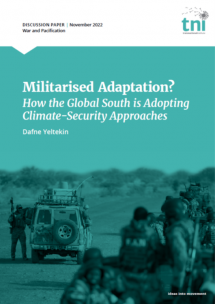Ideas into movement
Boost TNI's work
50 years. Hundreds of social struggles. Countless ideas turned into movement.
Support us as we celebrate our 50th anniversary in 2024.

Climate change is increasingly treated as a security issue by high income countries with disproportionately high levels of military spending. However there are more low and middle income countries integrating climate security language into their national strategies. This discussion paper explores the implications and the dangers of militarised responses that could further deepen injustice for those most affected by the climate crisis.
